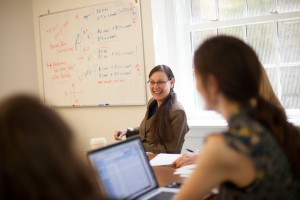by Pooja Shah '17
 Cornell psychologist Valerie Reyna, along with co-investigator Valerie Hans from the Cornell Law School, has received a $390,000 grant from the National Science Foundation to better understand damage award decision-making.
Cornell psychologist Valerie Reyna, along with co-investigator Valerie Hans from the Cornell Law School, has received a $390,000 grant from the National Science Foundation to better understand damage award decision-making.
Juries are often at sea about award amounts, with widely differing outcomes for cases that seem comparable. To make sense of this process—and, ultimately, improve the process of juror decision-making—the grant builds on evidence-based scientific theory developed at Cornell.
Reyna, professor of human development in the College of Human Ecology, said the research seeks to identify the causes of inconsistent jury awards and to test credible and cost-effective solutions that could reduce unwarranted inconsistency. Researchers will apply fuzzy-trace theory, believing that jurors often understand the gist of damages but have difficulty mapping verbatim numbers (dollar awards) onto that gist.
Currently, jurors are provided with limited guidance by the legal system and are presented with injuries that are often difficult to value. For instance, Reyna said, how do we value the loss of a spouse, the pain of a severe physical injury, or the inability to hug a child? Researchers will evaluate the effectiveness of potential legal reforms—such as providing meaningful numbers as benchmarks and “scaling” instructions that place damages in perspective. Preliminary evidence suggests that such behavioral nudges can improve the process of translating a qualitative human injury into a quantitative monetary award.
Reyna, along with Hans and Cornell students, recently published a related paper, “The Gist of Juries: Testing a Model of Damage Award Decision Making,” in Psychology, Public Policy, and Law. (Read more about the paper in the Cornell Chronicle.)
The grant was made by the NSF Law and Social Sciences Program, which supports interdisciplinary research proposals that promote a greater understanding of the connections between law and human behavior while advancing scientific theory.

